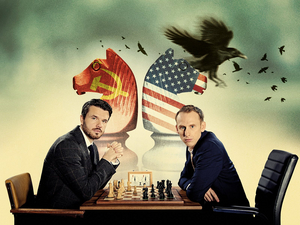Review: RAVENS: SPASSKY VS FISCHER, Hampstead Theatre

![]() It's almost impossible today to conjure the media landscape of 1972 - two television channels with news programmes early evening and late, four radio stations with bulletins on the hour, mass circulation inky newspapers. There wasn't much news (compared to today's overload) and single stories could dominate the agenda for weeks at a time.
It's almost impossible today to conjure the media landscape of 1972 - two television channels with news programmes early evening and late, four radio stations with bulletins on the hour, mass circulation inky newspapers. There wasn't much news (compared to today's overload) and single stories could dominate the agenda for weeks at a time.
Such was the case for the World Chess Championship between Boris Spassky and his challenger, the mercurial American, Bobby Fischer. Even at the age of nine, I was aware of it and that its significance went well beyond who was best at moving pieces round the board - this was "Two Tribes" 70s style.
Tom Morton-Smith's new play tells its tale, shedding light on that manifestation of the Cold War and saying plenty about the new politics of conspiracy theorists, alternative facts and the absence of trust. The polyester suits and beige-grey interiors say 1972, but plenty jumps 47 years to be appallingly relevant now.
Ronan Raftery gives us a champion who had led a sheltered life as a chess player (the Soviets carving up the title from 1946 to 1972 amongst the products of their "machine") and as a man, travelling little and naive in the ways of psychological warfare. Spassky is very much the leaden-footed George Foreman to Fischer's Muhammad Ali.
Ah, Bobby Fischer. The playwright may not like the free pass we give geniuses, but, in sport at least, the evidence is there. The most gifted sports stars I have witnessed were all somewhat unhinged - Diego Maradona, John McEnroe and Ronnie O'Sullivan. All were indulged, of course, but all sports stars (all stars really) are. One can't help thinking that the genius gene is a little corrupted.
Fischer has elements of all three of those named above - and then some. Robert Emms's Fischer displays an encyclopaedia of mental problems, sociopathy being too thin a word to corral them all. Incredibly, Fischer was to descend even further into psychosis in the years that followed, the poster boy for The West, earning the soubriquet "troubled" more than most.
Both principals give fine, committed performances, Emms burning energy at a ferocious rate. There's strong support too from the players' seconds and minders, and the poor Icelandic and FIDE saps who have to cope with the two adolescents in men's bodies. Simon Chandler is particularly impressive in his cameo as FIDE President, lamenting the absence of fundamental trust required to make any collaborative activity (chess, politics) work, and Gary Shelford does a good job with his down-to-earth Icelandic minder, the only person with whom Fischer appears to bond.
As director, Annabelle Comyn moves the er... pieces round the board skilfully, but the heavy lifting for the staging is done by movement director, Mike Ashcroft, who suggests the game's mental effort and psychological battles by sending Raftery and Emms into a kind of dance with something of the ambiguity of Jacob Epstein's Jacob and The Angel - there's a struggle, but both men need to hold each other up to validate the selves each have created.
Like much that one sees these days in theatres, in cinemas or on television, the flaw of the play is its length. Such compelling figures are sketched quickly and, even these days, most of the audience will not require Henry Kissinger on the phone expositing on the stakes. There's 40 minutes could be shorn without losing much.
The current Chess World Champion is also a part-time model and makes millions on the board and off it. Magnus Carlsen owes much to the late Bobby Fischer, but I suspect he was pleased that he couldn't join him in a London pub after he retained his title last autumn. Fischer didn't like people and that feeling was reciprocated.
Ravens: Spassky vs Fischer continues at Hampstead Theatre until 18 January, 2020.
Read our interview with Ronan Raftery
Reader Reviews
Videos

